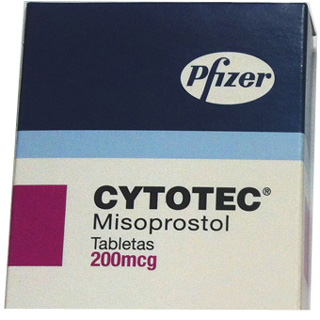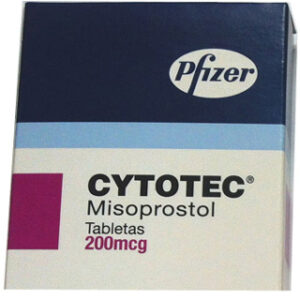Overview and Uses
Cytotec, or misoprostol, is a prostaglandin analog typically prescribed for the prevention of gastric ulcers induced by nonsteroidal anti-inflammatory drugs (NSAIDs). It can also be used off-label for inducing labor, causing cervix softening prior to surgical procedures like an abortion, and managing postpartum hemorrhage. Misoprostol functions by imitating the activity of prostaglandins, thus protecting gastric mucosa and contracting the uterus.
Dosage and Administration Guidelines for Cytotec (Misoprostol) in Various Medical Applications
The dosage of Cytotec differs based on the specific indication for use. To prevent NSAID-induced ulcers, the usual dose is 200 micrograms taken orally four times daily with meals and at bedtime. For gynecological uses, dosage protocols can vary drastically and should only be guided by a healthcare provider. The route of administration may change too—it can be oral, sublingual, or vaginal, depending on the specific medical scenario.
Here’s a simple table outlining dosage information for Cytotec (misoprostol) in different medical scenarios:
| Medical Purpose | Dosage of Cytotec |
|---|---|
| Prevention of Stomach Ulcers due to NSAID Use | 200 mcg orally 4 times daily, preferably after meals and at bedtime |
| Induction of Labor | Varies depending on the specific protocol and gestational age, typically starting with a low dose of 25 mcg vaginally or orally every 3 to 4 hours |
| Medical Abortion (Early Pregnancy) | Varies depending on the specific regimen, commonly involves taking 800 mcg vaginally or sublingually as a single dose or multiple doses |
It’s important to note that these dosages are general guidelines, and the actual dosage may vary based on individual patient factors and the healthcare provider’s recommendations. Always follow the prescribed dosage and instructions provided by your healthcare provider.
Precautions and Warnings
Cytotec demands caution when prescribed. Individuals with a history of cardiovascular disease, dehydration, or renal impairment necessitate careful consideration due to the drug’s potential to cause significant gastrointestinal side effects and alterations in fluid and electrolyte balance. Extreme caution is advised for the elderly or those in frail health. Usage in women of childbearing potential should be under strict circumstances; if used for gynecologic reasons, a negative pregnancy test is often required before initiation. Concomitant use with certain drugs also warrants close monitoring.
Contraindications
Use of Cytotec is absolutely contraindicated in pregnant women when used to reduce the risk of NSAID-induced ulcers due to its strong uterotonic action which can induce abortion or cause birth defects. Additionally, individuals with known hypersensitivity to misoprostol or any of the excipients within the product should avoid this medication. Pre-existing intestinal, renal, or hepatic diseases may also contraindicate the use of Cytotec.
Drug Interactions
Misoprostol can interact with a variety of pharmacological agents. Antacids containing magnesium should be used with caution as they may worsen diarrhea, a common side effect of Cytotec. The efficacy of the drug can also be reduced when taken concurrently with certain foodstuffs, and certain drugs may alter its absorption or metabolism. Healthcare practitioners should thoroughly assess the patient’s medication regimen to avoid any potential interactions.
Side Effects
The administration of Cytotec can elicit side effects, predominantly within the digestive system. Frequent reports include diarrhea, abdominal pain, and dyspepsia. Headaches, spotting and cramps have also been reported in females utilizing the drug for gynecological purposes. As with any medication, if side effects are severe or persistent, medical advice should be sought. Long-term use requires consideration of the risk-benefit balance for the individual.
Pregnancy and Breastfeeding
Misoprostol should not be used during pregnancy for ulcer prevention due to its pregnancy termination capabilities. Women of reproductive potential using this medication for gastrointestinal indications should be taking reliable contraceptive measures. For gynecologic uses, rigorous protocols are followed. While breastfeeding, caution is essential since the drug is excreted into breast milk and could potentially influence neonatal health and feeding.
Overdose and Missed Dose
In the event of overdose, the individual may experience symptoms including tremor, sedation, breathlessness, seizures, gastrointestinal distress, fever, and palpitations. Medical assistance should be pursued immediately. If a patient misses a dose, it should be taken as soon as remembered unless it is almost time for the next scheduled dose. In such events, skip the missed dose and resume the regular dosing schedule. Doubling up doses is not advised.
Storage and Handling
Proper storage is crucial to maintain the efficacy and safety of misoprostol. Cytotec tablets should be stored at or below 25°C and kept in their original packaging to protect from moisture. Medications should be kept out of reach of children and discarded appropriately when no longer needed or expired. Healthcare professionals should handle this drug carefully, adhering to all recommended safety protocols.






Paul (verified owner) –
Product quality is excellent. Delivery took longer this time.